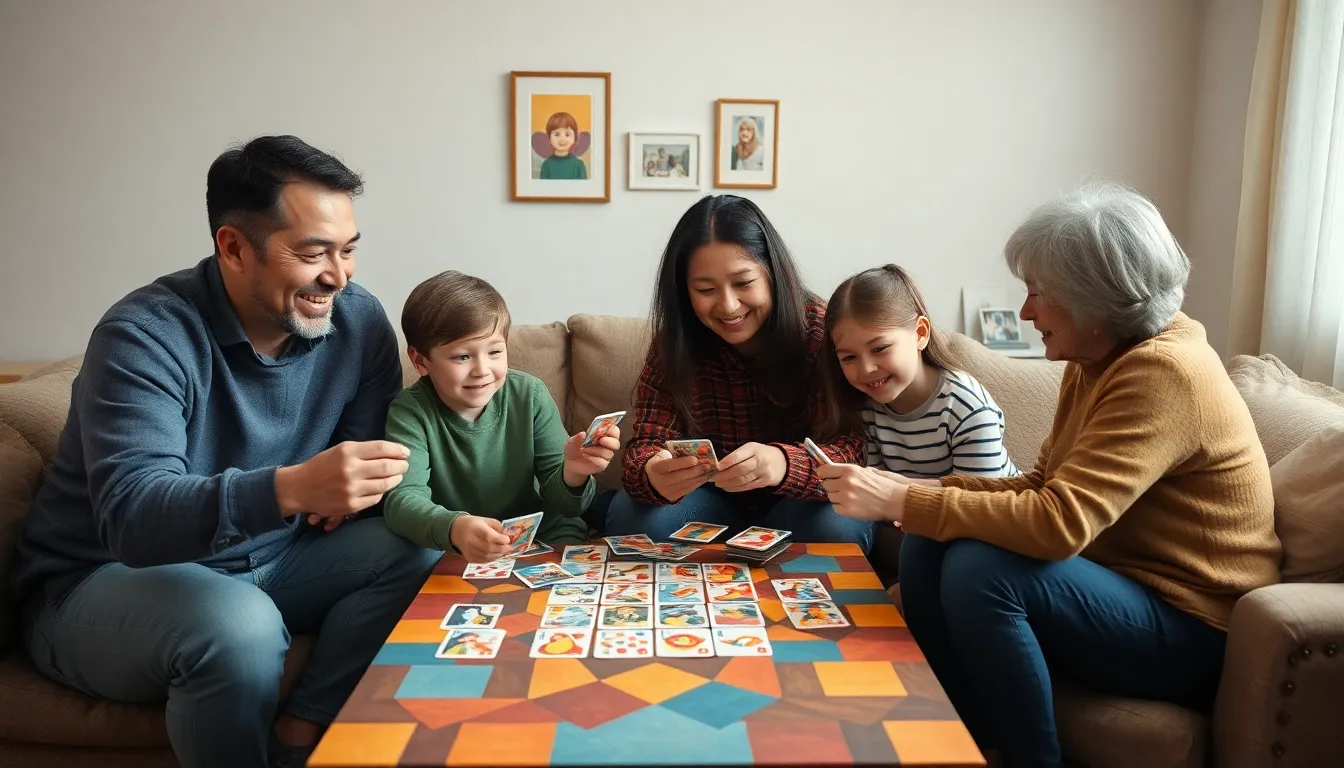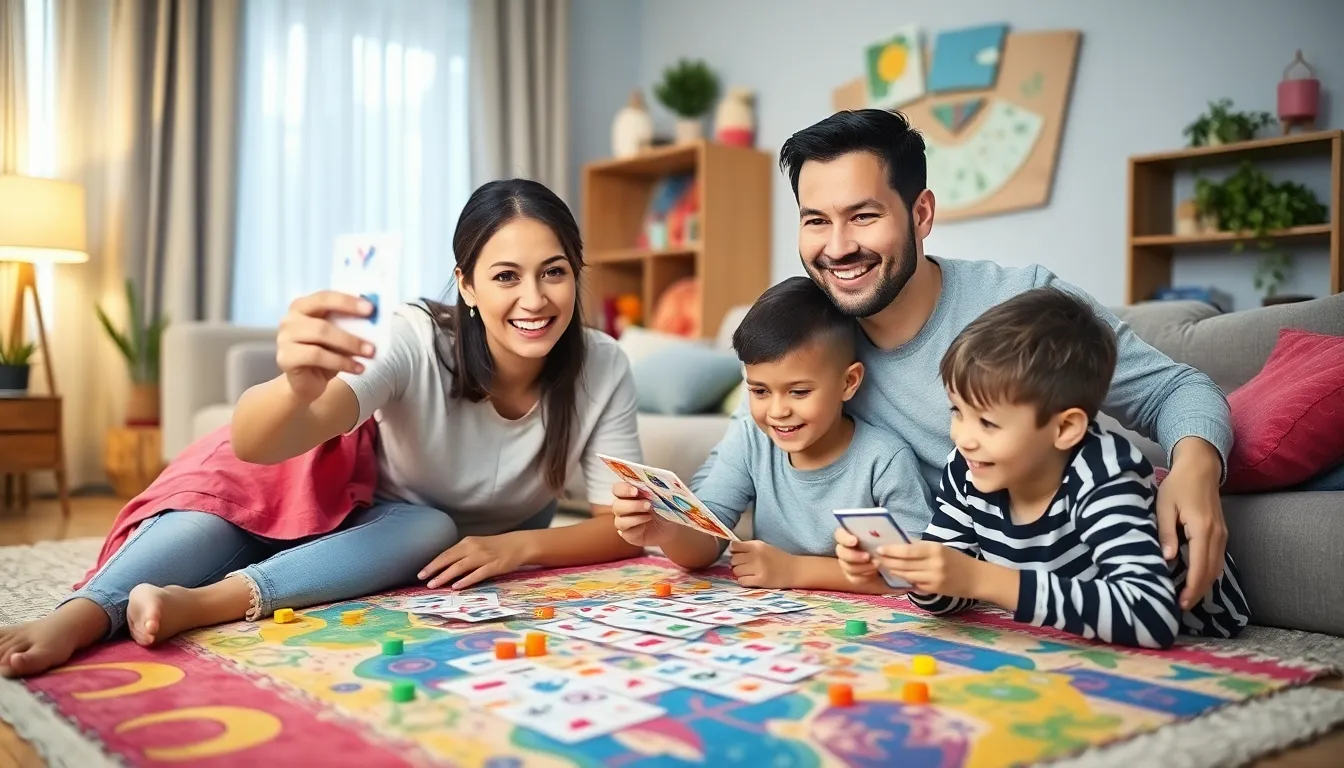In today’s fast-paced world, finding quality time for family bonding can be a challenge. Memory games offer a fun and engaging way to bring everyone together while boosting cognitive skills. These games not only entertain but also create lasting memories, making them perfect for family gatherings or quiet nights at home.
From classic card matches to innovative digital options, memory games cater to all ages and preferences. They encourage teamwork, enhance concentration, and foster healthy competition. By incorporating these games into family routines, families can strengthen their connections while enjoying the benefits of improved memory and focus. Whether it’s a rainy day or a weekend gathering, memory games provide endless opportunities for laughter and learning.
Table of Contents
ToggleBenefits Of Memory Games For Families
Memory games offer various benefits that contribute to family bonding and personal development. Engaging in these activities supports cognitive growth and enhances social skills.
Cognitive Development
Cognitive development improves significantly through memory games. Engaging with these games exercises the brain, enhancing skills such as attention, concentration, and problem-solving. Studies indicate that children who regularly participate in memory tasks demonstrate better retention and recall abilities. Adults also experience cognitive benefits, as these games help maintain mental sharpness. Frequent gameplay encourages critical thinking, as players must strategize to win.
Social Interaction
Social interaction flourishes within the context of memory games. Families bond over shared experiences during gameplay, fostering teamwork and communication skills. Collaborative play encourages players to discuss strategies and celebrate achievements together. Healthy competition arises as family members challenge one another, building resilience and sportsmanship. Engaging in these games also creates a relaxed atmosphere, allowing for meaningful conversations that strengthen relationships.
Types Of Memory Games


Memory games come in various forms, each offering unique ways for families to engage and strengthen their cognitive skills. The following categories outline popular types of memory games suitable for family play.
Card Games
Card games are classic options for family memory training. Common examples include:
- Concentration (or Memory): Players flip over cards to find matching pairs, enhancing memory recall.
- Match Up: Involves pairs of cards with pictures or words that players must match, supporting visual recognition and memory skills.
- Sequence: Players arrange cards in a specified order, encouraging pattern recognition and sequential memory.
These games promote not only cognitive skills but also encourage collaboration and social interaction among family members.
Board Games
Board games provide a tactile experience that engages families in memory challenges. Popular choices include:
- Scrabble: Involves building words, enhancing vocabulary and memory through strategic thinking.
- Catan: Players remember resources and develop strategies, promoting memory retention and planning skills.
- Forget Me Not: A dedicated memory game aimed at players recalling the correct sequences and strategies.
Board games build teamwork while stimulating memory through interactive play.
Digital Memory Games
Digital memory games leverage technology to enhance engagement. Notable examples include:
- Lumosity: Offers a range of memory-boosting games tailored to different skill levels and ages.
- Peak: Features games focused on memory, attention, and problem-solving, allowing for personalized challenges based on user performance.
- Brain Train: Combines entertainment with cognitive tasks, promoting memory improvement in a fun format.
These digital platforms provide accessible memory training options for families, allowing for flexible gameplay at home or on-the-go.
How To Choose The Right Memory Game
Selecting the right memory game requires consideration of several key factors. These aspects help ensure that the game aligns with family preferences and needs.
Age Appropriateness
Age appropriateness directly influences engagement and effectiveness. Choose games that cater to the age range of family members. For younger children, consider options with vibrant images and simple rules, like card games featuring familiar characters. For older kids and adults, select games that challenge cognitive skills, such as strategic board games or complex digital formats. Many memory games specify age recommendations; follow these guidelines to optimize the gaming experience.
Game Complexity
Game complexity impacts how satisfying the experience is for all players. Assess family members’ familiarity with memory games before deciding. Start with beginner-level games to avoid frustration, then gradually introduce more challenging options as skills improve. Complex games may foster deeper strategic thinking and collaboration, while simpler games can increase confidence and enjoyment. Balance between complexity and participation ensures an enjoyable experience for everyone involved.
Tips For Playing Memory Games As A Family
Engaging in memory games as a family requires thoughtful preparation to maximize enjoyment and bonding. These tips help create a supportive atmosphere and encourage participation.
Creating A Fun Environment
Creating a fun environment is essential for family memory games. Arrange a comfortable space with ample seating and minimal distractions. Ensure adequate lighting to make the game visually engaging and enjoyable. Use colorful game pieces or cards to capture attention and enhance the overall experience. Decorating the area with playful elements can further instill excitement and anticipation. Encourage laughter and good-natured banter to make the atmosphere enjoyable.
Setting Up Regular Game Nights
Establishing regular game nights fosters family connection and strengthens relationships. Designate a specific day each week or month for memory games, making it a tradition everyone looks forward to. Rotate game selections to keep the experience fresh while allowing each family member to showcase their favorite memory games. Sticking to a routine encourages commitment from all participants, leading to enhanced engagement and collaboration. Scheduling a consistent time helps ensure everyone is available, facilitating uninterrupted fun.




